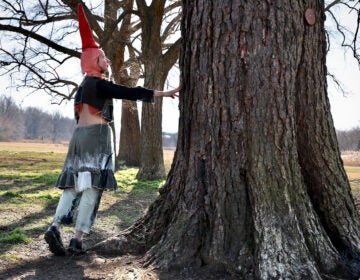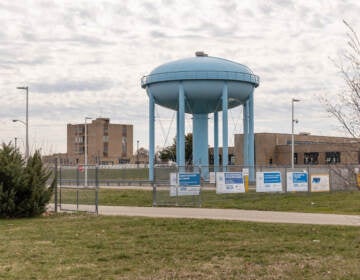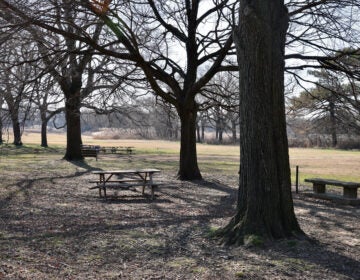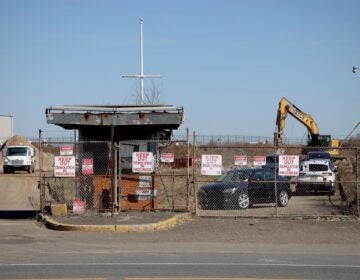Philly Zoning Board delays FDR Park tree-cutting decision
At issue are 48 mature trees, which the Fairmount Park Conservancy proposes cutting down to make way for athletic fields.
Listen 1:01
Mature trees shade a picnic area which is slated to become a soccer field at FDR Park. (Emma Lee/WHYY)
Have a question about Philly’s neighborhoods or the systems that shape them? PlanPhilly reporters want to hear from you! Ask us a question or send us a story idea you think we should cover.
It’s not yet clear whether a plan to build athletic fields in a partially naturalized area of FDR Park in South Philly can go forward unchanged.
The city of Philadelphia’s Zoning Board of Adjustment (ZBA) declined to vote Wednesday on a special exception that would allow the Fairmount Park Conservancy to cut down dozens of large trees in the park’s former golf course area — which some park users have nicknamed the Meadows — to build athletic fields and courts, play areas, and a new parking lot.
“We know we have people in the audience on both sides of this who want to express themselves,” ZBA Chair William Bergman said Wednesday, following lengthy testimony on behalf of the nonprofit Fairmount Park Conservancy, which is leading the project. “It’s just too much to try to get in today.”
The work is part of a $250 million renovation of the park that promises a new welcome center, playgrounds, fieldhouse, nature trails, and dozens of athletic fields and courts.
The plan aims to address current chronic flooding at the park and future sea level rise by dredging the center of the park, building a 33-acre tidal wetland, replacing malfunctioning tide gates that regulate the impact of the tidal Delaware River on water levels in the park, and using the dredged soil to elevate the edges of the park, where the athletic fields and other amenities are planned.
Work has already begun on the welcome center renovations and wetland, which the Philadelphia International Airport is funding as an offset for disrupting other wetlands for its cargo expansion project. A new playground with a “mega swing set” opened last year.
The Fairmount Park Conservancy’s lawyers came before the ZBA Wednesday seeking a special exception to cut down 48 heritage trees in the northwest quadrant of the park in order to build the “Picnic & Play” phase of the project, which includes five multi-purpose turf playing fields, four basketball courts, four baseball fields, tennis or pickleball courts, a playground, parking, and two picnic areas. They say the area already contains a “soil stockpile.” The ZBA chose to defer its decision to an unspecified later date to move on to other agenda items on Wednesday.
City Parks and Recreation officials say the five multipurpose athletic fields could serve upwards of 60,000 youth athletes annually, helping address a shortage of quality sports facilities in South Philly.
“I foresee FDR Park, once it’s fully complete, being a place where there’s a lot of things going on, there’s a lot of families, … a lot of people who are coming together and having a good time, enjoying themselves, staying active,” said Anthony Meadows, president of the South Philly Sigma Sharks, a youth football, basketball, and cheer organization that plans to use the new sports facilities for some of their games. “Some of these places that I go in Florida for youth football tournaments, I’m like, ‘Wow, why can’t that be in Philadelphia?’”
But opponents of the plan argue it will destroy what’s left of the Meadows — which they see as rare wild space in Philly — in favor of artificial turf fields that will only be open to the public part of the time.
At a packed meeting of nearby RCOs Friends of FDR Park and Packer Park Civic Association last week, dues-paying members voted “overwhelmingly” in opposition to the plan as presented, according to an email newsletter Friends of FDR Park sent the next day. The email said Many members called for fewer fields and more trees to be saved in this phase.
“We’re pushing a boulder up a hill,” Kat Kendon, a resident of Point Breeze and member of the PHS Tree Tender program, which plants trees in neighborhoods, said during the RCO meeting. “Our efforts are futile when the institutions tasked with stewarding our parks can move to clearcut heritage trees in one fell swoop.”
Philadelphia code requires developers to seek a special exception from the ZBA in order to cut down healthy, undamaged heritage trees, or trees that are at least two feet in diameter and belong to one of around 30 non-invasive species of trees listed by the city.
City Council passed a bill in 2022 — in line with some recommendations in the Philly Tree Plan — that removed an exception to these tree preservation rules for parkland and open space, but added an exception for streambed restoration or wetland creation sites. Months earlier, hundreds of trees had been cleared from a city-owned defunct golf course in West Philadelphia to prepare for renovations, including creek restoration.
The city aims to increase and equalize tree canopy throughout Phillyso that each neighborhood reaches 30% tree cover in less than three decades.
In addition to the 48 healthy heritage trees, the Picnic & Play phase of the FDR Park renovation, as proposed, would result in the clearing of 16 heritage trees deemed “dead, damaged, or diseased” and more than 375 smaller trees. The Conservancy plans to replace these with over 1,000 young trees that are 2.5 inches in diameter.
“An inch of sapling in no way equates to an inch of mature tree,” Kendon said.
Mike Trumbauer, a restoration ecologist working for the Conservancy, testified Wednesday that without raising the elevation of the former golf course, native trees growing there that are not adapted to wet soils could start to decline as climate change brings more water to the site. He said the proposed athletic fields could not be moved to other parts of the park without impacting other ecological resources.
Opponents of the plan have also raised concerns that the artificial turf fields would contain toxic PFAS — which the Inquirer found in the old Veterans Stadium turf after several former Phillies died of brain cancer — and retain more heat than natural grass fields.
Allison Schapker, chief operations & projects officer at the Fairmount Park Conservancy who leads FDR park renovation efforts, said during last week’s RCO meeting that turf fields are needed to accommodate demand because they can sustain more hours of playing time than natural grass fields. She promised turf used on the fields will not contain PFAS, and will be certified PFAS-free by an independent lab.
Several years ago, the city of Portsmouth, N.H., found PFAS in artificial turf that a supplier had confirmed was free of the class of chemicals.
The Zoning Board of Adjustment will announce the date the Conservancy’s special exception hearing will resume “as soon as we can,” Chair Bergman said Wednesday.
WHYY is your source for fact-based, in-depth journalism and information. As a nonprofit organization, we rely on financial support from readers like you. Please give today.








